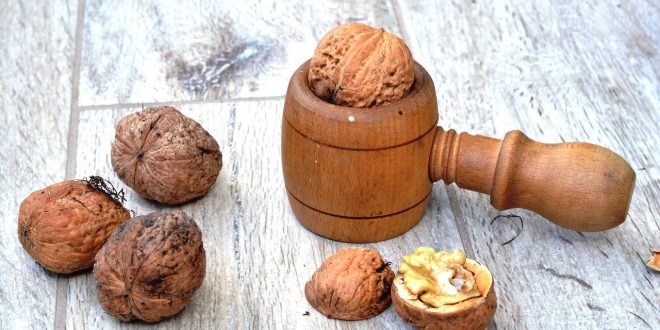Doesn’t the walnut look like a miniature brain? In China, walnuts are quickly becoming a popular snack, and in traditional chinese medicine, these are rumored to help one’s brain. Although walnuts and brains certainly look similar, what really makes the walnut such a desirable snack?
Walnuts are rich in an essential fatty acid— omega-3. Humans and mammals cannot produce the Omega-3 fatty-acid naturally, so we must take it in through our food. Omega-3 is essential in keeping the brain functioning. If our brain is low in Omega-3, depression, cognitive degeneration, and impaired eyesight may occur. Eating a handful of walnuts regularly means that we can be more responsive to emotions. Walnuts also raise melatonin levels by three times, so it helps relieve sleeplessness and insomnia. If you can not sleep because of the stress of homework or too excited by video games, ingesting a few walnuts before bed may help.
The walnut is the powerhouse of nutrients. Manganese, copper, iron, calcium, phosphorus are some of the many nutrients the walnut holds. These help build a healthy and happy body. Walnuts contains more antioxidants such as folic acid and vitamin E in greater quantities than other nuts. Black walnuts have the highest contents of amino acid arginine, which is used for cell division and protein synthesis.
Some food you can eat with walnuts are seafood, algae and fatty fish. They are some of the best sources of Omega-3 fatty acids too. We will be benefit from eating fish couple of times each week since the brain will more efficiently when higher levels of Omega-3, especially the DHA in the blood. Grilled, broiled and baked fish have great flavor and are on the healthier side.
Berries, especially dark ones such as blackberries, blueberries, and cherries are a rich source of phytochemical called anthocyanins and other flavonoids that may boost memory function. Eat a handful of berries for a snack, mixed into walnuts or a smoothie will be a great choice.
Getting adequate vegetables, especially cruciferous ones including broccoli, cabbage and dark leafy greens, may help improve memory too. Combined with walnuts, these food are great for salad, sandwich and dinner.
 Tempus Magazine By Students, For Students
Tempus Magazine By Students, For Students 



